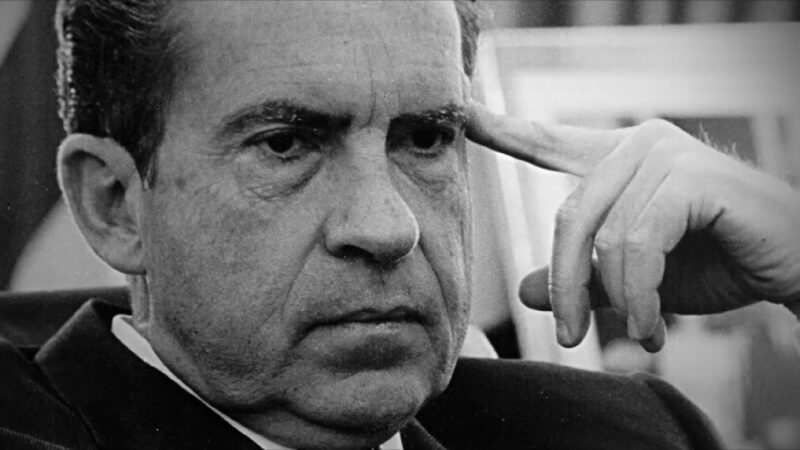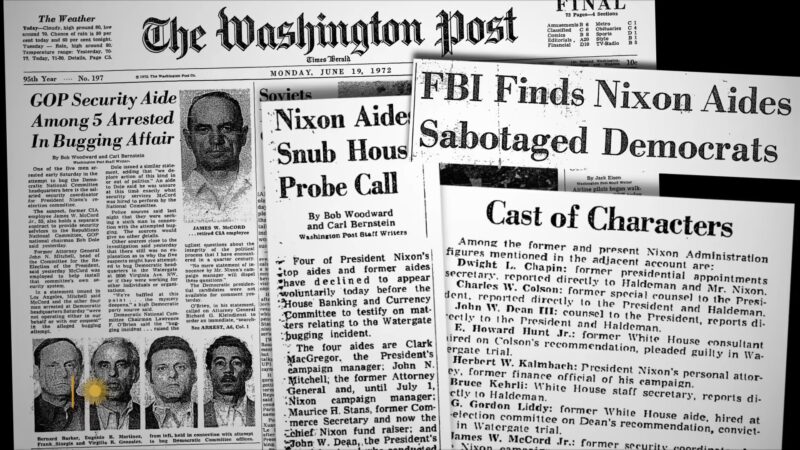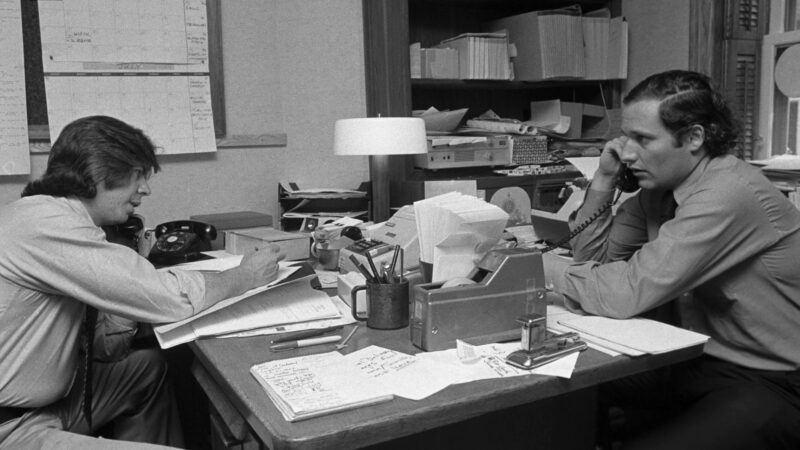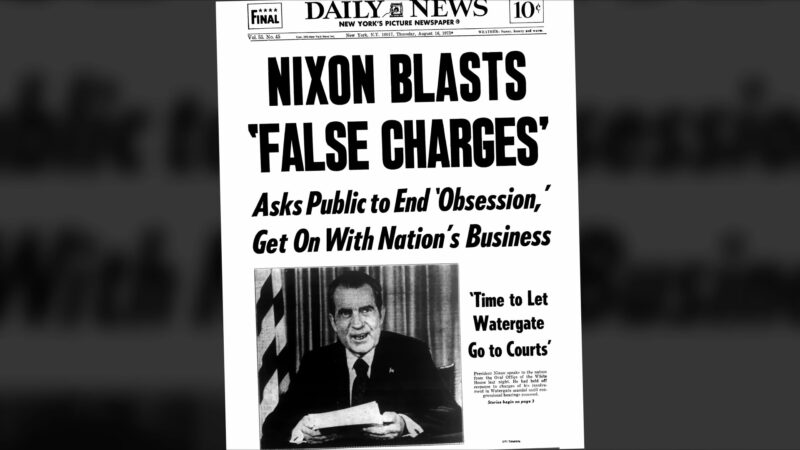The Washington Post’s coverage of the Watergate scandal not only marked a significant moment in journalistic history but also led to the newspaper receiving the prestigious Pulitzer Prize in 1973.
It is one of the best-known stories in journaling ever. It has influenced later generations of journalists who wanted to follow the examples of the two main faces behind presenting the biggest scandal in the US history to the public.
This insight will discuss the magnificent journalism on behalf of The Washington Post, highlighting the key roles played by reporters Bob Woodward and Carl Bernstein.
The Watergate Scandal – An Overview

The Watergate scandal began with a break-in at the Democratic National Committee headquarters located in the Watergate office complex in Washington, D.C., on June 17, 1972.
Initially thought to be a minor event, this break-in unraveled into one of the most significant political controversies in United States history. President Richard Nixon’s administration was eventually found to have been involved in a wide array of clandestine and often illegal activities.
The scope of these activities was vast, ranging from bugging the offices of political opponents to using government agencies like the FBI, CIA, and IRS for purposes of harassment and political espionage.
Nixon, facing almost certain impeachment and removal from office, resigned on August 8, 1974, becoming the only U.S. president to do so. The aftermath of the scandal had a lasting impact on American politics.
It led to numerous reforms in campaign finance regulations and governmental transparency. Furthermore, the scandal left an indelible mark on American culture.
Terms like “Watergate” and “gate” as a suffix for subsequent political scandals became part of the lexicon. The episode raised serious questions about presidential power, the rule of law, and the accountability of public officials, altering the American public’s perception of political leaders and their expectations for transparency and integrity in government.
The Initial Involvement of the Washington Post

The Washington Post’s journey into the heart of the Watergate scandal began with the initial report of the break-in. At first glance, the story seemed like a routine burglary, but two young reporters, Bob Woodward and Carl Bernstein, sensed something more sinister.
Their curiosity and determination set the stage for one of the most significant journalistic pursuits of the 20th century. In the days following the break-in, Woodward and Bernstein started connecting the dots, revealing that the burglars had ties to the Nixon reelection campaign.
This discovery was not an immediate breakthrough but a small step in a larger, more complex investigation. The Washington Post’s decision to pursue the story was not without risks.
At the time, the newspaper was competing with other major publications and was under immense pressure to maintain credibility and readership. As the story developed, the role of The Washington Post became increasingly central.
The newspaper’s commitment to the story was unwavering, despite facing criticism and pressure from the Nixon administration and its supporters.
The Post’s editors, particularly Ben Bradlee, provided crucial support and guidance, ensuring that the reporting was thorough and the facts were meticulously verified.
Bob Woodward and Carl Bernstein – The Reporters Behind the Story

Woodward, a Yale graduate and a former naval officer, brought a meticulous, disciplined approach to the investigation. Bernstein, on the other hand, who had started working as a full-time journalist at the age of 16, brought a street-smart, intuitive style to the team.
Together, they formed a formidable journalistic duo, complementing each other’s strengths and relentlessly chasing leads. One of their most significant breakthroughs in the investigation came from an anonymous informant known as “Deep Throat,” later revealed to be Mark Felt, the associate director of the FBI.
Felt provided crucial information that guided Woodward and Bernstein through the complex web of political espionage and sabotage orchestrated by the Nixon administration.
Woodward and Bernstein’s reporting was characterized by a deep commitment to getting the story right. They spent countless hours tracking down sources, verifying information, and piecing together the intricate puzzle of the Watergate scandal.
Their work often involved meeting with sources in secret locations, working late into the night, and facing constant pressure and scrutiny.
Fun Fact: BBC hosted Woodward and Bernstein and the host spoke with them about AI and how it might put journalism in danger.
Key Investigative Techniques and Challenges
The investigation into the scandal was marked by a series of innovative investigative techniques and numerous challenges. Bob Woodward and Carl Bernstein, spearheading this effort, employed a combination of traditional journalism methods and groundbreaking approaches to uncover the truth behind the complex scandal.
One of the key techniques used was developing and maintaining a network of confidential sources. The network was crucial for obtaining sensitive information that was not publicly available.
The most famous of these sources was “Deep Throat,” whose guidance was instrumental in navigating the labyrinth of political deception. Woodward and Bernstein’s ability to build and sustain trust with their sources was pivotal in their success.
Another significant technique was the cross-referencing of information. They diligently verified every piece of information they received, often cross-checking facts with multiple sources.
This rigorous verification process ensured the accuracy of their reporting, which was essential in maintaining credibility, especially given the contentious nature of their findings.
Who Was the Mysterious Deep Throat?

For decades, the identity of Deep Throat was one of the most intriguing mysteries in American journalism, not revealed until 2005 as Mark Felt, the then-Associate Director of the FBI.
He met Woodward in secret, often in a parking garage at night, to share information about the involvement of the Nixon administration in the Watergate break-in and subsequent cover-up.
Felt’s high-ranking position within the FBI gave him access to information that was not publicly available, making his contributions to the investigation invaluable.
The guidance provided by Felt was often cryptic and required Woodward and Bernstein to engage in extensive investigative work to understand its full context and implications.
His famous advice, “Follow the money,” became a guiding principle for the reporters as they unraveled the complex financial trail linking the break-in to the Nixon reelection campaign.
The relationship between Felt and Woodward was built on a foundation of trust and a mutual understanding of the risks involved. Felt’s decision to become an informant was driven by his concerns about the Nixon administration’s attempts to obstruct the FBI’s investigation into the Watergate scandal.
Impact on Nixon’s Presidency and Political Repercussions

The Watergate scandal, propelled into the national spotlight by The Washington Post’s reporting, had a profound impact on President Richard Nixon’s tenure and the broader political landscape of the United States.
The revelations of the scandal gradually eroded Nixon’s support, leading to significant political consequences. As the details of the Watergate break-in and subsequent cover-up unfolded, it became clear that President Nixon and his close aides were deeply involved.
The scandal exposed a range of illegal activities, including obstruction of justice, abuse of power, and violation of campaign finance laws. This erosion of trust in the presidency was unprecedented in American history.
The scandal led to the resignation or indictment of over 40 government officials, showcasing the extent of corruption within the Nixon administration. Nixon, facing almost certain impeachment and conviction, resigned from the presidency on August 8, 1974, becoming the first and only U.S. president to do so.
Nixon’s resignation marked a turning point in American politics. It was a stark reminder of the importance of accountability and the rule of law, even for the highest office in the land.
In 1972, Nixon won the reelection with 68%, but only months after Watergate, his approval rate dropped below 31%. Furthermore, only 15% of the US citizens thought that the President wasn’t aware of the scandal before it became public.
The scandal led to a significant shift in public perception of political leaders, with a newfound emphasis on transparency and ethical conduct. In the wake of Watergate, Congress enacted a series of legislative reforms to prevent such abuses of power in the future.
These included new laws on campaign finance, government transparency, and oversight, such as the Federal Election Campaign Act and the Ethics in Government Act.
Additionally, the scandal led to the establishment of new norms and procedures for presidential conduct and the interaction between different branches of government.
The Pulitzer Prize
The exceptional reporting of The Washington Post on the Watergate scandal was honored with the prestigious Pulitzer Prize for Public Service in 1973.
Receiving the Pulitzer Prize for Public Service, the highest honor in journalism, highlighted the significant contributions The Post made to the public’s understanding of the Watergate scandal.
The legacy of The Washington Post’s Pulitzer Prize for its Watergate reporting continues to influence journalism today. All the best-known faces in journalism speak about the Washington Post’s work on this case has inspired them.
It serves as a reminder of the power of the press in shaping history, promoting transparency, and fostering an informed and engaged public.
Impact on Modern Journalism

The Washington Post’s groundbreaking coverage of the Watergate scandal not only reshaped the political landscape of the United States but also had a profound impact on the field of journalism, setting new standards for investigative reporting.
Raising the Bar for Investigative Journalism
The relentless investigative work of Bob Woodward and Carl Bernstein demonstrated the critical role of journalism in uncovering truth and holding those in power accountable.
Their approach—characterized by deep investigative research, the use of confidential sources, and the corroboration of information—became a gold standard for investigative journalism.
This rigorous methodology has inspired generations of journalists to pursue in-depth reporting, emphasizing the importance of not taking information at face value and the need for thorough verification of facts.
The Watergate coverage underscored the idea that journalism is not just about reporting news but about uncovering the truth behind the news.
Influence on Media Ethics and Practices
The ethical considerations involved in the Watergate reporting, particularly the use of anonymous sources, sparked widespread debate within the industry.
The reliance on Deep Throat and other confidential informants raised questions about the balance between protecting sources and ensuring the credibility and accuracy of the information presented.
This led to a more nuanced understanding and application of journalistic ethics, with media organizations developing clearer guidelines on the use of anonymous sources.
The principle of protecting a source’s identity has been enshrined as a fundamental tenet of journalistic integrity, crucial for enabling whistleblowers and insiders to come forward with vital information without fear of retribution.
The Role of Media in Democracy
The Washington Post’s coverage of Watergate highlighted the essential role of the free press in a democratic society. By exposing corruption at the highest levels of government, the Post reaffirmed the media’s role as the “Fourth Estate,” a watchdog capable of checking governmental power and informing the public of abuses.
This has reinforced the public’s expectation of transparency and accountability from their leaders and institutions, fostering a more engaged and informed citizenry.
After the scandal, a survey was carried out in the Midwest, and the signs of the declining trust in government were more than obvious. The results were extraordinary for that time:
- 55% felt the government was run for big interests
- 46% felt government could be trusted only some of the
time - 33% felt that quite a few people running the government
were crooked
FAQs
Why was it called Watergate?
Watergate was the name of the office complex in Washington, D.C., where the Democratic National Committee had its headquarters. It was also the site of the break-in by five men who were linked to President Richard Nixon’s re-election campaign in 1972.
Who won 4 Pulitzer prizes?
Only two people have won four Pulitzer prizes each: Robert Frost and Eugene O’Neill. Frost won four prizes for poetry in 1924, 1931, 1937, and 1943. O’Neill won four prizes for drama in 1920, 1922, 1928, and 1957.
What is the highest award in journalism?
The Pulitzer Prize for Public Service is considered the highest award in journalism. It is awarded to a news organization for a distinguished example of meritorious public service through the use of its journalistic resources. The winner receives a gold medal and a certificate.
What book won the Pulitzer Prize in 2023?
Two books won the Pulitzer Prize for fiction in 2023: “Demon Copperhead” by Barbara Kingsolver and “Trust” by Hernan Diaz. Both books are reimaginations of classic novels: “Demon Copperhead” is based on Charles Dickens’s “David Copperfield” and “Trust” is based on F. Scott Fitzgerald’s “The Great Gatsby”.
Summary
The legacy of The Washington Post’s Watergate coverage continues to resonate, serving as a testament to the impact that determined and ethical journalism can have on society. It reminds current and future generations of journalists of the profound responsibility they carry in upholding the principles of transparency, integrity, and public service.
We are covering other stories about journalism. For example, check out what is the average salary of Local News Anchors in the US today.


